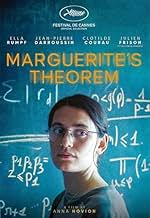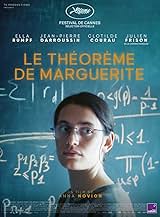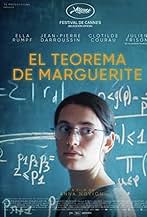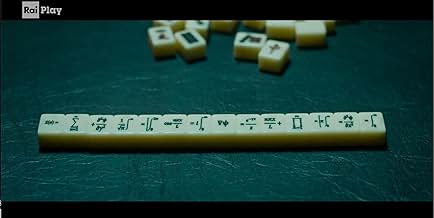IMDb RATING
6.8/10
2.6K
YOUR RATING
A brilliant mathematics student at France's top university the Ecole Normale Supérieure. On the day of her thesis presentation, a mistake shakes up all the certainty in her planned-out life,... Read allA brilliant mathematics student at France's top university the Ecole Normale Supérieure. On the day of her thesis presentation, a mistake shakes up all the certainty in her planned-out life, she decides to quit everything and start afresh.A brilliant mathematics student at France's top university the Ecole Normale Supérieure. On the day of her thesis presentation, a mistake shakes up all the certainty in her planned-out life, she decides to quit everything and start afresh.
- Awards
- 4 wins & 1 nomination total
Xiaoxing Cheng
- M. Kong
- (as Maurice Cheng)
Karl Ruben Noel
- Le danseur
- (as Karl-Ruben 'Rubix' Noël)
Pakirathan Sulakshan
- Le mathématicien
- (as Sulax Pakirat)
Featured reviews
Despite familiar themes, the movie is well-made and avoids being overly dramatic. It is well worth watching and takes more after the movie 21 than 'Good Will Hunting' or 'A Beautiful Mind'. A very solid performance by Ella Rumpf (known from the movie "Raw") who portrays Marguerite. Starts a bit slow but if you bite the bullet and continue watching, you will be rewarded. Some plot twists are predictable (just like in the movie "21"), but others you will not see coming. The movie explores a common problem, talented young people who get discouraged when they realize success isn't guaranteed. Marguerite is a brilliant math student who crumbles when her big theorem turns out to be wrong. While the movie explores familiar territory (genius obsessed with proving themselves), it might not resonate with everyone unless you're really into number theory (a specific branch of mathematics). The film uses camera tricks to show how overwhelmed Marguerite feels and how she struggles to decide between her passion for math and the harsh realities of the world. I also loved the movie and the performances of Julien Frison (Lucas) and Sonia Bonny (Noa). But Ella Rumpf (Marguerite Hoffmann) takes the crown. Perfect casting for this role. Rated the movie 9/10 and well deserved. No need to say that this is a must see (despite the slow start).
A movie about a semi-autistic young female mathematician struggling to fit into the society, with a happy end: she finds her boy and even succeeds in proving an uber-hard conjecture. In a sense, it's like Neo from The Matrix: started as an outcast but then saves the world and gets the girl (boy). The nerdy version of Cinderella plot.
As a movie, it's not that exciting. Simply because the math part would be impenetrable to the vast majority of the audience. So it's reduced to gibberish and meaningless math symbols on blackboards. Instead, the movie focuses on the social inadequacy: at the age of 25, the heroine is still dependent on her mom. She quits her math PhD after her first failure and tries to survive in the city by taking up random working-class jobs. When she's inevitably fired from those for disrespecting authority, she starts earning cash illegally from Mahjong gambling. In real life this would eventually land her in jail or on welfare or in an institution. But in this movie, she follows into Maria Curie's steps and finds love among fellow scientists. For a proper happy end, she also has to single-handedly solve a problem that hundreds of old bearded dudes failed at. Cheers to that.
For me this movie, despite its shortcomings, had a special touch because I am actually kinda like that girl myself. Well, I'm not autistic and I even had a successful business, but I'm still of that type in general. I'd say there are at least 8 times more men like this than there are women. So, guys would be unlikely to have a similar story. Simply because there are barely any girls to go around. Normally they just either stay alone, or have bad marriages/divorces or... I dunno... sell startups and buy trophy babes. Notice how just about every person around the heroine is a guy. That's accurate.
As a movie, it's not that exciting. Simply because the math part would be impenetrable to the vast majority of the audience. So it's reduced to gibberish and meaningless math symbols on blackboards. Instead, the movie focuses on the social inadequacy: at the age of 25, the heroine is still dependent on her mom. She quits her math PhD after her first failure and tries to survive in the city by taking up random working-class jobs. When she's inevitably fired from those for disrespecting authority, she starts earning cash illegally from Mahjong gambling. In real life this would eventually land her in jail or on welfare or in an institution. But in this movie, she follows into Maria Curie's steps and finds love among fellow scientists. For a proper happy end, she also has to single-handedly solve a problem that hundreds of old bearded dudes failed at. Cheers to that.
For me this movie, despite its shortcomings, had a special touch because I am actually kinda like that girl myself. Well, I'm not autistic and I even had a successful business, but I'm still of that type in general. I'd say there are at least 8 times more men like this than there are women. So, guys would be unlikely to have a similar story. Simply because there are barely any girls to go around. Normally they just either stay alone, or have bad marriages/divorces or... I dunno... sell startups and buy trophy babes. Notice how just about every person around the heroine is a guy. That's accurate.
It's a truth not quite universally acknowledged that films about hard intellectual or creative work, well, suck. I'm not sure if higher mathematics is particularly prone (all of Good Will Hunting except the Robin Williams bits; the -entirety- of A Beautiful Mind; everything but the facts of that Ramanujan film are at least as far removed as, say, Star Wars is and from astrophysics).
This, though, does not.
The central character is not a transcendent but flawed genius but hardworking and self-denying; the moments of inspiration (which are a real thing) look real and come through sheer effort, not effortless revelation with accompanying sound effects; and the scholarly politicking and casual STEM sexism are, well, true to life.
But - and this is probably burying the lede, sorry - it is also (1) splendid performances by all of the main cast; (2) a very thoughtful reflection on the connection between abstract thought and the human condition; and (3) an actually enjoyable film.
This, though, does not.
The central character is not a transcendent but flawed genius but hardworking and self-denying; the moments of inspiration (which are a real thing) look real and come through sheer effort, not effortless revelation with accompanying sound effects; and the scholarly politicking and casual STEM sexism are, well, true to life.
But - and this is probably burying the lede, sorry - it is also (1) splendid performances by all of the main cast; (2) a very thoughtful reflection on the connection between abstract thought and the human condition; and (3) an actually enjoyable film.
I saw this movie about a month ago and had a privet debate with myself weather I should review it. The problem I had was, that as a movie - there's nothing out of the ordinary with it. It's well done the acting is of the highest quality, especially the lead, Ella Rumpf and Jean Pierre Darroussin, who plays her professor. But that's about it. Not amazingly bad not amazingly good, just a well-done movie.
But that's not all there is to a movie. It had one point that for me made it all worth my while. It's a story about a brilliant mathematician that manages to really reach her potential only when she comes to accept her emotional relation to math. We're all used to hear how science must be rational and detached from any sort of emotion. In fact, the idea is repeated a few times in the movie itself. Thing is, Marguerite sees math as the thing that keeps her world together, and as such she's very emotional about it. Without accepting that fact she can't really reach her potential, no matter how brilliant she is. And I just loved the way the movie made this point. For that reason alone, I rated it as I did, and for that reason I think it's a movie worth seeing.
But that's not all there is to a movie. It had one point that for me made it all worth my while. It's a story about a brilliant mathematician that manages to really reach her potential only when she comes to accept her emotional relation to math. We're all used to hear how science must be rational and detached from any sort of emotion. In fact, the idea is repeated a few times in the movie itself. Thing is, Marguerite sees math as the thing that keeps her world together, and as such she's very emotional about it. Without accepting that fact she can't really reach her potential, no matter how brilliant she is. And I just loved the way the movie made this point. For that reason alone, I rated it as I did, and for that reason I think it's a movie worth seeing.
Here is a movie that will interest my mathematician friends. I look forward to them watching it and sharing their impressions. 'Le théorème de Marguerite' (2023) is a variation on the classic formula 'boy meets girl, boy loses girl, boy gets girl back', with a few changes. First of all, the lead character is a woman, a young and brilliant mathematician who will meet a boy, so it's more like 'girl meets boy'. And yes, both the girl and the boy are mathematicians, so 'a mathematician girl meets a mathematician boy'. Otherwise, the formula applies - in cinema and in mathematics. The film by director Anna Novion is a film about the passion for mathematics. There aren't many movies that bring math heroes to the screen, but a few of them are memorable. 'Good Will Hunting' and 'A Beautiful Mind', for example, also offered us heroes whose life and passion are consumed in front of blackboards filled with mathematical equations. 'Le théorème de Marguerite' aims to join this select club.
The heroine of the film is called Marguerite Hoffman. She is a brilliant PhD student at one of the most prestigious colleges in France and mathematics is her whole life. The doctoral thesis supervised by Professor Werner is a demonstration of one of the most famous problems that mathematicians have faced for centuries: the Goldbach conjuncture. (for the curious: 'Any even number is the sum of two prime numbers'). The proposition was verified by numerical computers until they ran out of power, but it was never proved. On the day of the thesis presentation, however, a catastrophe occurs. Julien, another brilliant young mathematician who had joined Wener's team a few days before, points out a fatal flaw in the proof. Marguerite has a total mental breakdown and decides to abandon mathematics and the teacher whom she blames for betraying her by associating with the new student. She will try to work as a saleswoman, she will meet Noa, a dancer with whom she shares a rented apartment and who will try to bring her back to life. Marguerite, however, may leave mathematics, but mathematics does not leave her. The talent will help her become a brilliant mahjong player (a complex Chinese game with stones) and her orderly mathematical mind will struggle with feelings for the rival she associates with in solving the impossible problem.
Can love be rationalized? Can human mind function in the absence of feelings? You will receive answers to these questions in the story Anna Novion co-wrote. The main problem with the film is, in my opinion, the fact that these answers are kind of what we expected. Focus is on mathematics and love. Social aspects that might have been interesting - the position of women in academia, the life of the Chinese community in Paris - are touched upon only tangentially. The plot is also quite predictable. A bit more boldness and a story with more surprises wouldn't hurt. Fortunately, much of these weaker parts are offset by Ella Rumpf's formidable acting performance. The actress is no longer very young, she is more than ten years older than the heroine she plays in this film and has a filmography of almost 20 films behind her. And yet, with this role she won the Lumiere award for 'best female revelation' and four other awards - completely deserved. Her Marguerite Hoffman is intelligent and vulnerable, passionate to the point of obsession when it comes to the mathematics she has known since childhood and when it comes to the love she discovers late. With any luck for her and us viewers, 'Le théorème de Marguerite' is the first major film of a great actress. Among the other actors in the cast, I cannot skip Jean-Pierre Darroussin in the role of the teacher who guides the heroine's steps in mathematics even when their paths diverge, alongside the girl's mother played by Clotilde Courau. Goldbach's conjuncture is still waiting for its demo, and we, the viewers, are waiting for the future films of director Anna Novion and actress Ella Rumpf.
The heroine of the film is called Marguerite Hoffman. She is a brilliant PhD student at one of the most prestigious colleges in France and mathematics is her whole life. The doctoral thesis supervised by Professor Werner is a demonstration of one of the most famous problems that mathematicians have faced for centuries: the Goldbach conjuncture. (for the curious: 'Any even number is the sum of two prime numbers'). The proposition was verified by numerical computers until they ran out of power, but it was never proved. On the day of the thesis presentation, however, a catastrophe occurs. Julien, another brilliant young mathematician who had joined Wener's team a few days before, points out a fatal flaw in the proof. Marguerite has a total mental breakdown and decides to abandon mathematics and the teacher whom she blames for betraying her by associating with the new student. She will try to work as a saleswoman, she will meet Noa, a dancer with whom she shares a rented apartment and who will try to bring her back to life. Marguerite, however, may leave mathematics, but mathematics does not leave her. The talent will help her become a brilliant mahjong player (a complex Chinese game with stones) and her orderly mathematical mind will struggle with feelings for the rival she associates with in solving the impossible problem.
Can love be rationalized? Can human mind function in the absence of feelings? You will receive answers to these questions in the story Anna Novion co-wrote. The main problem with the film is, in my opinion, the fact that these answers are kind of what we expected. Focus is on mathematics and love. Social aspects that might have been interesting - the position of women in academia, the life of the Chinese community in Paris - are touched upon only tangentially. The plot is also quite predictable. A bit more boldness and a story with more surprises wouldn't hurt. Fortunately, much of these weaker parts are offset by Ella Rumpf's formidable acting performance. The actress is no longer very young, she is more than ten years older than the heroine she plays in this film and has a filmography of almost 20 films behind her. And yet, with this role she won the Lumiere award for 'best female revelation' and four other awards - completely deserved. Her Marguerite Hoffman is intelligent and vulnerable, passionate to the point of obsession when it comes to the mathematics she has known since childhood and when it comes to the love she discovers late. With any luck for her and us viewers, 'Le théorème de Marguerite' is the first major film of a great actress. Among the other actors in the cast, I cannot skip Jean-Pierre Darroussin in the role of the teacher who guides the heroine's steps in mathematics even when their paths diverge, alongside the girl's mother played by Clotilde Courau. Goldbach's conjuncture is still waiting for its demo, and we, the viewers, are waiting for the future films of director Anna Novion and actress Ella Rumpf.
Did you know
- TriviaAccording to a NY Times article a reward of 1 million dollars was offered offered from 2000 to 2002. Currently there is no official monetary prize specifically for proving or disproving Goldbach's Conjecture similar to the prizes offered for some other famous problems, such as the Millennium Prize Problems.
- How long is Marguerite's Theorem?Powered by Alexa
Details
- Release date
- Countries of origin
- Official sites
- Languages
- Also known as
- Un Pas de Côté
- Production companies
- See more company credits at IMDbPro
Box office
- Budget
- €2,870,000 (estimated)
- Gross worldwide
- $1,162,522
- Runtime1 hour 53 minutes
- Color
- Aspect ratio
- 2.39:1
Contribute to this page
Suggest an edit or add missing content

Top Gap
What is the Canadian French language plot outline for Le Théorème de Marguerite (2023)?
Answer

























